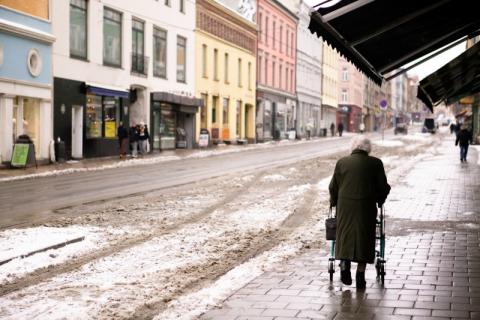Reduce the risk of harm in cold weather

The current very cold weather conditions increase the risk of illness and accidents. So the following advice has been issued to the community by the Public Health Agency (PHA) and the Health and Social Care Board.
The PHA emphasises the importance of keeping warm in order to stay healthy.
Evidence suggests that long periods of extremely low temperatures can lead to an increased risk of adverse health effects such as increased respiratory disease, heart attacks and stroke. The elderly are particularly vulnerable. Excessive cold can also cause a rise in blood pressure, lowered resistance to infections and worsening of symptoms of rheumatoid arthritis.
So the public are being advised to take some basic steps to look after themselves and their elderly relatives and neighbours over the coming days. This advice is as follows:
Stay warm
- Wear several thin layers of clothing as they will keep you warmer than one thick layer.
- When inside keeping moving and try not to sit still for more than one hour at a time as activity generates body heat.
- Eat well with frequent warm healthy meals and drinks – but avoid alcoholic drink as this can lower body temperature.
Heating your home
- When heating your home ensure open fires have guards in front of them, air vents are not blocked and additional heating appliances being used have been recently serviced and well maintained in view of the risks of carbon monoxide poisoning (for further advice see HSENI link below).
When outside in cold weather
- Only go outside into the cold if absolutely necessary and if you have to venture outside wear warm gloves, a hat and footwear with non-slip soles.
- Take care on icy footpaths and consider using a walking stick to ensure you keep your balance.
Finally the PHA advises that people check on their vulnerable and elderly neighbours who may not be able to get to shops to make sure they have everything they need to keep warm and keep healthy.
Indeed, the Board and Agency remain indebted to the considerable and ongoing effort of people across the community who have a voluntary caring responsibility to others such as elderly dependent relatives, friends or neighbours. This effort is being discharged by countless people and is much valued for its ability to assist the wider health and social services at the present time.
Useful web links
- www.publichealth.hscni.net/news/think-carbon-monoxide
- www.nidirect.gov.uk/
- www.ageuk.org.uk/spreadthewarmth
- www.nidirect.gov.uk/8155_-_co_a5_leaflet_d16.pdf
- www.hseni.gov.uk/
Getting access to GPs and hospitals
For anyone who takes ill or needs to see a doctor the position is as follows:
GP practices throughout Northern Ireland remain open and continue to provide their normal daytime services. People should contact their practice in the normal manner for medical advice or for obtaining a prescription.
However, they should also bear in mind that their GP services are very busy and if they can wait, they should do so. Similarly, the best treatment for colds and the flu is to stay at home, rest, drink plenty of fluids and use over-the-counter remedies to ease symptoms.
GP out-of-hours providers are coping well at a time of year when there is seasonally a high demand for services, with an increase in calls from patients. People should nevertheless be patient, and should bear in mind that the GP out-of-hours service is for urgent calls that cannot wait until their own GP practice is next open. It is important that patients always remember to phone their GP out-of-hours service first, before attending, as this can often assist in avoiding an unnecessary journey. The aim is to ensure patients' concerns are dealt with in the most appropriate way. For members of the public wishing to access GP out-of-hours services, the phone number will be available on the answering machine of their GP practice, in the telephone directory or on the website at www.gpoutofhours.hscni.net
Hospital services are continuing to operate largely as normal, and people should continue to attend for appointments unless they have been formally advised by their hospital of a postponement. If anyone is unable to keep an appointment owing to the weather, it will be enormously helpful if they can notify the hospital in advance.
More widely, people should remember not to attend a hospital accident and emergency department for a condition that is not urgent, as the prime function of these centres is to cater for people who are seriously ill and require immediate medical assistance.
The Board and the Public Health Agency also wish to commend and thank the many health and social care staff who have been able to reach their work despite the adverse weather and who are contributing hugely to maintaining a wide range of services for the community. In particular, they are very grateful to the emergency services for helping a number of care staff to reach patients in snow-affected and isolated areas.
